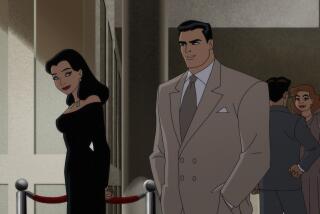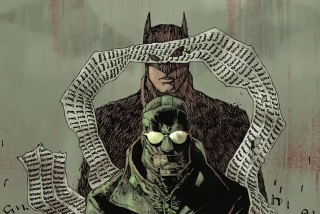Libertarians are on Batman’s side
Holy smaller government and lower taxes, Batman!
“Batman Begins,” Christopher Nolan’s brooding comic-book blockbuster, has been embraced by its fans for many things: Nolan’s dark, shadowy aesthetic; the detail with which he has teased out Batman’s mythic origins; and Christian Bale’s wholly credible performance as the psychologically complex billionaire-turned-Dark Knight.
But “Batman Begins” has become something of a cult hit among fans of free markets, individualism and Ayn Rand, among other things. Perform a cursory Google search with the terms “Batman Begins” and “capitalism,” for instance, and you come up with a blogosphere love-fest, with conservative and especially libertarian commentators praising the film’s pro-business, anti-statist themes.
The film explores how Bruce Wayne, an otherwise mild-mannered heir to a billion-dollar fortune, became Gotham City’s Caped Crusader, representing his good-hearted parents as paragons of noblesse oblige, who use their wealth to build a high-tech monorail system for Gotham, among other civic projects.
When the Waynes are murdered in front of their young son and their killer is sent not to prison but to a psychiatric hospital, Bruce goes away for seven years, trains as a vigilante and returns to Gotham -- now a cesspool of criminal and governmental corruption -- to mete out justice.
Along the way, he stages a hostile takeover of the publicly traded Wayne Enterprises, puts a dent in an evil mental health system, proves that individual initiative and guts are more effective than entrenched bureaucracies (in this case, Gotham’s compromised police department) and, perhaps most notably, turns the typical Hollywood trope of rich-businessman-as-villain on its immaculately coiffed head.
David Boaz, executive vice president of the Cato Institute, a libertarian think tank, saw “Batman Begins” recently at the encouragement of a friend at the Objectivist Center, which, according to its website, champions “reason, individualism, freedom and achievement.”
Boaz was happily struck by the fact that the hero was a businessman, he says, “but I think what was more interesting ... is that the movie takes a strong stand that some things are evil, some people are evil. Crime is bad. And criminals need to be punished, not to be understood and coddled and let out of jail for more therapy.”
Boaz says he was gratified as well to see a heroic portrayal of individualism and the idea “that it’s up to each person to take a stand and [that] each person has his own talents, abilities and opportunities. Bruce Wayne, because of his money and training, has more talent and opportunities to do these things than most of us, but it’s made clear that it’s important for everybody to take a stand.”
Although Hollywood often takes the rap for touting reflexively left-wing pieties, Boaz says the ideas that run through “Batman Begins” actually aren’t that rare at the multiplex or on TV; he cites such hits as “The Aviator,” with its multimillionaire hero, and “The Incredibles,” with its sly critiques of egalitarianism (“If everybody’s special, then nobody is”), as only the most recent examples.
“America is basically a libertarian country,” Boaz says, “so Americans are going to put libertarian themes into the art they create, and sometimes it’s more explicit and sometimes it’s less so.
“But it’s not a big surprise to see individualism, anti-totalitarianism and fighting for freedom and social tolerance showing up in American art.”
More to Read
The biggest entertainment stories
Get our big stories about Hollywood, film, television, music, arts, culture and more right in your inbox as soon as they publish.
You may occasionally receive promotional content from the Los Angeles Times.










